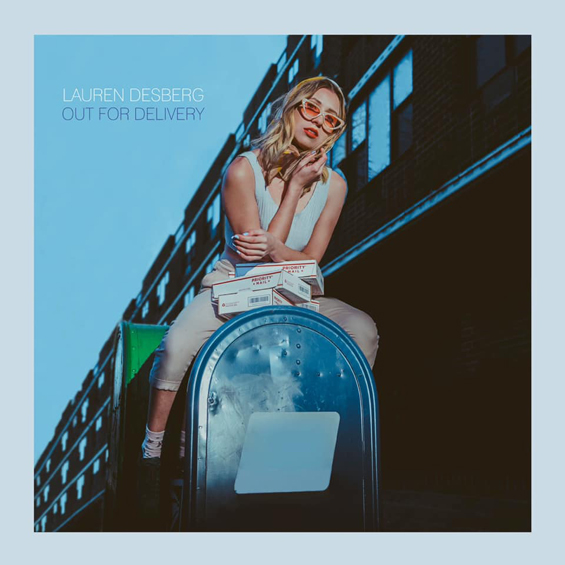

FIVE QUESTIONS WITH LAUREN DESBERG
Many a jazz singer cites Anita O'Day and Sarah Vaughan as influences, but it's a rare one indeed that also lists Karen Carpenter and NSYNC as personal faves. Such eclectic taste is reflected in the music Lauren Desberg performs on her third album Out For Delivery (reviewed here), which augments her vibrant originals with two standards. The Harlem-based singer, who as a teen attended the Los Angeles County High School for the Arts (LACHSA) and graduated from Boston's Berklee College of Music in 2012, is supported on the twelve-song release by a superb cast: saxophonist Braxton Cook, pianist Kris Bowers, guitarist Andrew Renfroe, bassists Ben Shepherd (electric) and Russell Hall (upright), and drummer Jonathan Barber. As striking as Desberg's command of both contemporary songcraft and traditional jazz is her voice, a magnificent instrument that distinguishes every song on which it appears. textura was delighted to speak with the singer recently about the new recording, its thematic content, and the album's unusual songs-and-interludes structure.
1. Your voice is a remarkably distinctive instrument. In fact, as a sign of just how distinctive it is, I was listening recently to a new Tokyo Dawn Records compilation called The Nature Vol. 1 (you'll no doubt already know what's coming) when Eliza Dickson's “Gold” came on and I heard singing that I thought had to be you, and it turns out of course that you guest on the song. When did you first become aware of your unique vocal sound, and when did you decide to pursue singing in a jazz context as opposed to any other?
Well, thank you. I'm happy to have a sound that stands out! I've been singing since I was a little kid. In fact, I was always that singer; the one in school that could sing and got solos. I ended up going to an arts high school for voice where the options were jazz or classical voice. I had loved musical theater but was by no means ready for opera so I went into jazz. My freshman year I was really timid and didn't think too much of myself, but I remember a day distinctly the following year where I sang “Mr Paganini” alone to myself walking into a subway and having the thought, “Oh, shoot, you might be on to something here.”
2. Another impressive thing about your voice is that while there are moments on Out For Delivery where I might be reminded of another singer, say Ella Fitzgerald or Billie Holiday, your voice ultimately sounds like you alone. That being said, are there particular vocalists who influenced and/or inspired you?
I'd say my biggest singer influences are Anita O'Day, Sarah Vaughan, Gretchen Parlato [who produced Desberg's first EP, Sideways], and Karen Carpenter. I definitely did a lot of listening to get the sound I have today.

3. You're accompanied by fabulous musicians on the album: saxophonist Braxton Cook, pianist Kris Bowers, guitarist Andrew Renfroe, bassists Ben Shepherd and Russell Hall, and drummer Jonathan Barber (in fact, one of the things that initially piqued my interest in the album was the involvement of Barber, whose excellent Vision Ahead album I had the pleasure of reviewing last year). Are they musicians who've been playing with you for a while or are they ones you assembled specifically for the recording?
On my first two records I went the ‘get bigger names' route. For this album I got my friends and people that have played with me for a while now. Jonathan Barber is one of my good friends; he's been playing gigs with me since 2016. Andrew Renfoe (also on Vision Ahead) and I used to have a restaurant gig and have been playing together since 2015. Kris Bowers and I went to high school together so we go back fourteen years!! Ben Shepherd and I met in 2016 and he plays every gig with me in LA; he's insanely good. I actually recorded my album in LA partially so he and Kris could easily make time to be on it. Braxton has been doing gigs with me since 2016, and I sing background vocals on a few tracks on his albums. Russell Hall and I don't do as many gigs together ‘cause he's in the more straightahead scene, which made him perfect to play upright on the songs he did. Having people I have personal day-to-day relationships with on the album was really special.
4. One of the other striking things about the new album is that even though it mixes earlier songs (1935's “I'm Gonna Sit Right Down and Write Myself A Letter” and 1962's “The Sweetest Sounds”) with recent originals, the material never feels less than contemporary. Is this collapsing of the usual boundaries between past and present something you purposefully strive to achieve, or is it simply a natural outgrowth of your singing style, which remains consistent regardless of song era and genre, and your musicians' always-fresh presentation of the material?
You know, I think about this all the time: am I still singing standards because that's what I did for so long or are they just a part of me? They've certainly become a part of me in terms of writing. My melodies are very American Songbook. I always tell people, I can't (and won't) deny my love for NSYNC and Spice Girls, but to be a real jazzer you sort of can't love those groups, so I'm here in the cracks. Luckily I've gotten over the hump and get to make my own music that has a little of both!

5. Many of the album's themes have the potential to resonate with all ages, but the songs “The Way You Feel Inside” and “Something Wrong With Me” would no doubt connect with millennials dealing with online bullying, mental health, and the various insecurities wrought by social media. Did these songs grow out of your own experience grappling with such issues or were they ones you wrote more in general to address what you observed going on around you?
Absolutely wrote from personal experience! I'm fighting the good low self-esteem fight—no better medicine than expressing your emotions creatively. Songwriting is not easy, but, boy, does it make you feel so much better about whatever it is that has you feeling emotions. “Something Wrong With Me,” the song and the notion, is so, so deep in my life, and every once in a while I hear someone else randomly say it in a sentence and want to say, “Omigod, I have a song about this!”
Bonus question: One of the album's more unusual aspects is that Out For Delivery is slightly more than thirty minutes in length, and four tracks of the twelve are each less than two minutes long. What prompted you to present some songs as interludes and keep the overall running time to just over half an hour? And though Out For Delivery is being released now, it was recorded in 2017. Does it reflect your sound and approach now or has that changed since the material was recorded two years ago?
How do people have long albums? How long are songs? When I see people that have five-song EPs that are thirty minutes long, I think, “My God, that's very long!” It was totally not planned; there was no intention on being short. The interludes really were just little simple melodies I had but never fleshed out into full songs. Kris Bowers and I met up before a proper rehearsal with the band to go over music, and he told me to keep them as interludes. Kris is very smart and in the know so I listened! The interludes are some of my favourites on the album. The record was recorded in 2017 and completed in 2018. I'm the type of person who creates something and needs to sit on it a while, so here we are now two years later with a released album!
July 2019![]()